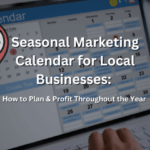We talk a LOT about content on this blog. By now, you’ve learned why you must add content to your website. A crucial part of your SEO strategy will be adding that 500-word blog post to your website every week and making sure your website pages are properly written. Remember, the content on your website must be written for humans, not for Google.
Well written website content does a lot more than just benefit your SEO. We won’t spend too long on this, as our primary focus is to show you how to maximize SEO potential, but these points are worth mentioning. With excellent text content, you can also:
- Tell your business’s story.
- Promote your products and services.
- Focus on your brand and show how you’re different from your competitors.
- Tell stories on how your products and services have solved problems for your customers.
- Deliver educated discussions about your industry, and effectively establish yourself as an authority in your customer’s eyes.
- By adding weekly content to your website, you’ll build an audience of folks who enjoy reading about your products and services. And soon enough, that audience will become repeat customers.
Ready to learn how to write excellent content for your website? Let’s get started.
Five Things You MUST Know BEFORE You Write Content for Your Website
Let’s take a look at a few of the basics of writing. Don’t worry. This isn’t an English Degree from a 4-year school. We’ll be brief.
1). Writing Style.
Be mindful of the style of your writing. Let’s put it this way, would a florist talk about her products with the same voice and attitude that a criminal defense lawyer would talk about his services? Probably not. A florist would likely use more endearing words, kind descriptives, possibly some slang, and other words that inspire warm emotions and a feeling of light-heartedness.
On the other hand, a criminal defense lawyer would likely write content in a very business-like, professional, compassionate, and confident manner. Be mindful of your industry and what products and services you are selling. What emotions are connected to your products or services? Try to write content in a similar emotion/style as the products and services you are selling.
2). Composing Content.
Simple is always better than complex. Whatever knowledge level you expect your audience to have, cut that in half and go with that. If you are a plumber and you want to write a page on how to plumb a house, consider writing a page on how to change out a toilet instead.
If you get too complicated or use too much insider language, folks will blow off your page and stop reading your content, which is the opposite of what we want them to do.
3). Grammar and composition.
Do you lack confidence regarding grammar? Are you worried about someone reading your content and losing interest in your business due to grammatical errors? Please don’t worry too much about this. It’s an easily solvable problem. Sign up for a free Grammarly membership at grammarly.com, or invest in the premium membership for a few bucks per month.
If you don’t want to use Grammarly, show your pages to a grammar-savvy friend. Always remember to capitalize the first word of every sentence, try to keep your sentences short and precise, use a comma during a break in a sentence, and don’t use big words or confusing industry terms (unless you define them).
4). Knowing your audience.
One of the rules of thumb in any form of writing is to know your reader. Who are you writing the content for? If you’re a plumber and your audience is folks looking for local plumbing repairs, your website pages should be concise, to the point, and offer value in as few words as possible. Talk about how to unclog a toilet, but don’t write a doctoral thesis on what about a toilet causes them to get clogged in the first place. But if you’re a marriage counselor, you may want to get a little wordier and spend more time talking about the many aspects of marriages, why marriage fails, and what you can do to help.
Your audience, if you’re a plumber, will want you to be quick and effective in solving their problem. But your audience, if you’re a marriage counselor, will want to see you write fuller, more illustrious, and more verbose content as they expect a more drawn-out explanation from you. Know who your audience is and compose content so that you build their trust and show them that you’re the person who can solve their problem.
5). Keywords.
Keywords within the content are crucial, but not to the degree that they are more important than the quality of the content itself. Back in the old days, some folks used to cram keywords into content to boost SEO. Google would always penalize them eventually, sometimes even shutting down their websites as a result. And today, while this practice is still done, it’s black hat SEO, and we’ll have none of that.
Write naturally about the products and services that you sell and your industry in general, and the keywords will find their way into the content naturally. Rather than writing one piece of content that is chock-full of keywords, it’s more beneficial to write a 500-word blog post every week and simply sprinkle a few keywords in here and there. The accumulative factor of keyworded content done over time will build your SEO up with stability and reliability, and it will be done white hat, not black hat.
Staring at the Blank Page – Actually Writing the Thing
We’ve already talked about the different types of subjects you can create content for, from DIY guides to de-mystifying misconceptions customers have about your services, talking about industry-relevant news, answering commonly asked questions, putting together testimonials, etc.
But how do you get started?
Putting those first few words on the page can be tricky. Here are some tips if you’re suffering from writer’s block and are having a difficult time getting started:
- Seek inspiration from within your industry. Try reading articles about your industry that you find interesting. Is there anything from those articles that might inspire you in your writing?
- What are others in your industry talking about? Watch a Youtube video from an industry leader’s speech and write down your takeaways from that speech. Then expand those takeaways into a blog post and make them your own.
- Just start writing. Even if it sounds like garbage at first, putting words on the page gives you a foundation, a base to build off, and a starting point for editing, refining, condensing, expanding, etc.
- Don’t feel like you need to start at the beginning. If you have an idea of what you want to say at the end of your blog post, but you’re not sure how to introduce the subject, write the ending first! Some of the best authors are known for writing the endings of their books first and then filling in the rest. As long as you’re putting words on a page, you’re making progress.
- Seek viewpoints from others. What do people find interesting about your industry? Ask your family members or friends about what they would like to know about your industry. Listen to what they have to say and determine how you would answer their questions. Possibly even record the conversation and use that conversation as a template for your content.
Service Page Template – Making a Badass “Services” Page
If you run a brick and mortar business and provide a service to your local community, a service page is critical. Prospective clients will want to know more about your service, and they’re likely to read this section of your website before they call or email you.
Here’s a checklist template for how to design and write a service page:
Title: List the title of your service, e.g., “Basic Plumbing Repairs.”
Introduction: In one paragraph right below the title, write a couple of sentences that talk about what plumbing repairs are, what can happen that might cause the need for plumbing repairs, and how important it is that a prospective customer use a qualified plumber to perform such repairs.
First Heading (First section): The headings of a webpage separate the content into sections, which is essential for readability and for search engines. In the first heading below the introduction paragraph, write something like, “Fixing Leaks, Our Most Commonly Requested Service.”
Body Paragraphs: Below the heading on fixing leaks, write a paragraph or two about leaks, why they happen, how they can be damaging, why they are costly when not repaired, how you fix them, and what makes you different from other plumbers in how you handle leaks.
Second heading (second section): Here, write a heading on your 2nd most frequently requested service. It could be something like, “Replacing Old Toilets – Leave This Mess to the Pros.”
Body Paragraphs: Write a paragraph or two on your 2nd most frequently requested service. Follow a similar approach as above.
Third heading (third section): Repeat the process above for as many services as you’d like to discuss (we recommend you talk about all of the services you’d like to promote).
Third body paragraph: Follow the approach for the above body paragraphs and repeat until you’ve discussed all of the services you’d like to talk about.
In Conclusion…
Text content for your website is easier to put together than it sounds. Like with anything else, practice makes perfect. It’s actually very difficult to mess this up. Any content on your website is better than no content, as any content will create some SEO benefits.
But if you can’t be bothered writing the content for your website, or if you want to absolutely maximize the SEO benefit offered with professional copywriting for your website, we at Clear Imaging can take care of this task for you. Give us a shout, and we’ll take care of your website content for you.






